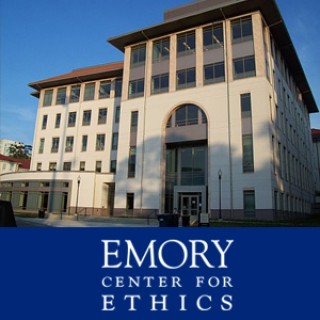
Center for Ethics: Special Events - Video
Follow Center for Ethics: Special Events - VideoAn international leader in the exploration of ethics, the Emory Center for Ethics is dedicated to exploring how ethical issues underlie the decisions that shape our minds, lives, and society.
- Sep 22, 2015 LATEST EPISODE
- infrequent NEW EPISODES
- 50m AVG DURATION
- 30 EPISODES
More podcasts from Emory University
Latest episodes from Center for Ethics: Special Events - Video

John Banja "Doctors Trash Talking Patients" The Colonscopy Case: An Ethical Perspective
John Banja "Doctors Trash Talking Patients" The Colonscopy Case: An Ethical Perspective

From Marcus Welby to the iPatient: Innovation and Myth in Modern Medicine David Magnus, PhD

Allan Kellehear - Public Health Approaches to End of Life Care: Implications for Spiritual Care
This lecture will begin with the globally widespread clinical, acute-care culture of palliative care before introducing an outline of public health/health promotion approaches to palliative care. A public health approach to palliative care is one that recognizes that many of the social, psychological and spiritual troubles that people living with dying, bereavement, and long term care are amenable to public health concepts of prevention, harm reduction, and early intervention. These interventions embrace community development, health promotion, death education, and ecological strategies. The future of palliative care must embrace this approach if it is to successfully achieve greater access for all and provide a meaningful continuity of care at the end of life. This approach brings internal and external challenges for chaplaincy and pastoral care, integral parts of palliative care.

A Blessing on the Moon is a new music-theater work composed by Andy Teirstein, and based on the novel by Teirstein’s collaborator, Joseph Skibell (the novel was published by Algonquin Books, 1997). Joseph Skibell often describes A Blessing on the Moon as “a novel masquerading as a folk tale.” Andy Teirstein describes his musical adaptation as “an opera masquerading as a folk spiel.” The journey of Chaim Skibelski, who has just been shot dead, and his Rabbi, who is now a crow, as they wander through Poland searching for an afterlife, lends itself easily to the genre of music-theater. Words, music and movement can be expressive of the edges of experience explored in the magical realism of this epic narrative, which contains wry humor, poetry, and a sharp sense of each character's perspective, even extending to the Polish family that has moved into the protagonist’s home, and the German soldier who has shot him. Co-sponsored by The Creative Writing Program and The Goldwasser Fund.

A Blessing on the Moon is a new music-theater work composed by Andy Teirstein, and based on the novel by Teirstein’s collaborator, Joseph Skibell (the novel was published by Algonquin Books, 1997). Joseph Skibell often describes A Blessing on the Moon as “a novel masquerading as a folk tale.” Andy Teirstein describes his musical adaptation as “an opera masquerading as a folk spiel.” The journey of Chaim Skibelski, who has just been shot dead, and his Rabbi, who is now a crow, as they wander through Poland searching for an afterlife, lends itself easily to the genre of music-theater. Words, music and movement can be expressive of the edges of experience explored in the magical realism of this epic narrative, which contains wry humor, poetry, and a sharp sense of each character's perspective, even extending to the Polish family that has moved into the protagonist’s home, and the German soldier who has shot him. Co-sponsored by The Creative Writing Program and The Goldwasser Fund

The images in this series are a study of contrasts between beauty and destruction. Ross Oscar Knight tells a story of life and feature the children as the future and hope of Haiti. His goal is to show the innocent spirit of these young people in an effort to inspire action from the viewers. Despite Haiti’s undignified reputation, today there are continued efforts to restore its communities and to promote the self-sufficiency of its people.

Laurie Zoloth - Beyond the Gates of The City: Public Health and Social Justice
Health care justice, especially in a global context, we are told, must be based in outcomes and efficiency yields, and using the arguments of the modern marketplace have been the basis for health care reform. This has taken us some of the way towards a health care system in America that is more just, yet it is still a matter of contention for some and for nearly everyone, only a beginning. What difficult questions need to be asked and answered before we can really make American health care a fair system? And what is the meaning of local or national justice when we newly understand the world and its health care needs as a global problem? This talk will raise some of the unsolved puzzles of health care reform and argue that for the hardest questions— sacrifice, duty, death and greed— we need reasons for action that go beyond the language of the marketplace, and use the traditions and languages found in Americans faith communities about obligations to the stranger in need.

Sister Carol Keehan - The Politics of Justice: The Nation's Healthcare Obligations and the Role of the Affordable Care Act

President Jimmy Carter - Public Health Religion and Ethics Lecture Series Nov. 13th, 2012

Sal Brownfield discusses his piece "Requiem for the Innocent - Memorial to 9/11"

















